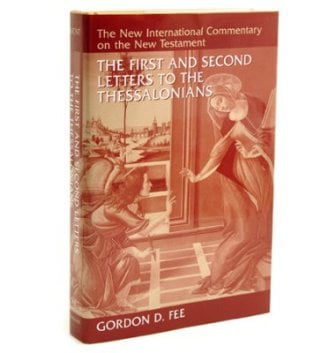(July 9, 2017) 8:50 AM I’m reading Gordon Fee’s commentary on 1-2 Thessalonians this morning. It’s truly a unique treasure-trove.
As Don Carson writes on the dust cover, “Fee could not be boring even if he tried. The zest of his prose makes him exciting to read, and his scholarship is always rigorous.” This morning I’m focusing on Fee’s discussion of what he calls the “disruptive-idle” in 2 Thess. 3. Here are a few takeaways:
1) Fee correctly notes the beautiful play on words Paul uses in vv. 11-12 when he writes ergazomenous and then periergazomenous. The Thessalonians weren’t being “busy.” They were “busy-bodies”!
2) Fee is right to “translate out” (as he puts it) the “walking” metaphor that Paul uses to describe a person’s behavior. (Greek students are aware of this controversy: peripateo versus zao.)
3) The “traditions” to which Paul refers here have to do more with how God’s people live in the world than simply how they think. Hence this classic Fee quote:
At this point a certain sector of the Christian church wants to yell “foul,” because they think one really can divorce how one is related to God (by faith alone) from how one who has such faith must live in the world. But Paul was not privy to the kind of theology that thinks such division between faith and works can actually be made. Paul is obviously dead against anything that resembles “faith + works = a right relationship with God.” But as this passage makes plain, he equally spells death for “faith” that does not lead to “works” (= behavior) appropriate to that faith.
4) I love Fee’s emphasis on the imperfective aspect of the verb pareggellomen in v. 10:
Paul’s verb (pareggellomen) is in the imperfect, thus implying an ongoing, or at least repeated, command.
Friend, I’m less and less impressed with many of the newer commentaries that seem to be coming out these days at a furious pace. Their authors are new names to me, perhaps even those who are just starting out in the academic world. The best voices, however, are often those with a world of experience, both in the classroom and in the world. I’m compelled by this commentary because I know Gordon Fee to be a man who’s not content to sit behind a set typing script for commentaries. He’s genuinely concerned about the mess we humans have made with the world around us — and within us. He gets down on our level, shoulders brushing. Fee, like so many other outstanding commentary writers, had been trained (whether in seminary or some other way) to believe that a story isn’t enough. Faith without works is in fact dead. We dilute the power of the Gospel when we divorce it from the world God came to redeem.
(From Dave Black Online. Used by permission.)
